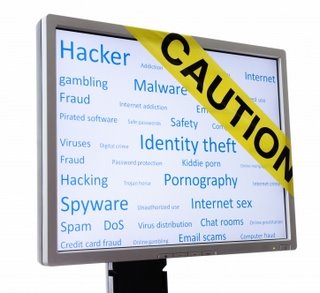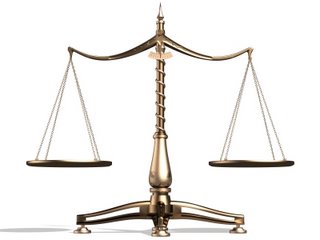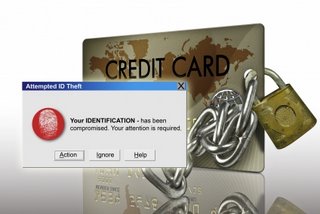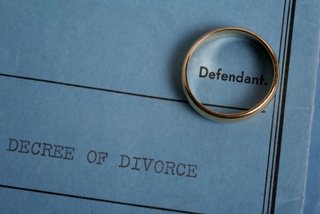Archive for April, 2009
Sunday, April 26th, 2009
Q:
Hello,
My wife didn’t pay a credit card that was in her name as an individual. She didn’t pay the bill and it went to collections. She avoided all attempts for collection and a judgment was issues against her in court.
Unfortunately for me we live in a community property state and the judgment reads….WIFE A as an individual and Husband as a community property. The judgment has been paid and I want it off my credit report. Since it was not mine to start how do I get it removed from MY personal report?
Thanks in advance,
Bryan
A:
Hi Bryan,
I find your issue very interesting. Typically a judgment filed against another person will not affect a spouses credit report unless you were part of the judgment. It does not matter if you are in a community property state, your social security number should not be attached to this judgment. I would re pull your credit report through our site by your self to see if it will show up. If you did a tri-merge credit report you may be getting the judgment mixed up with your wifes. Double check the judgment that was filed and make sure you were not part of the judgment. Otherwise I would dispute the credit bureau that is showing it on your credit report. Go here to dispute your credit report.
Mike Clover
CreditScoreQuick.com
Posted in Uncategorized | Comments Off
Sunday, April 26th, 2009

Now that the majority of taxpayers have filed their 2008 Income tax forms, the “phishermen” have a whole new angle to use when trying to gain access to your personal information.
Almost everyone has a fear of being audited. We’ve all heard too many stories about the Internal Revenue Service and how they can punish taxpayers for underpayment of taxes, suspected tax fraud, etc.
So when a letter comes from the IRS, most of us open it with a measure of stress. We know (well, most of us know) we haven’t done anything deliberately to trigger their suspicions – but what if we’ve made a mistake? IRS forms are at best, confusing.
That fear plays right into the hands of the criminals seeking to steal identities and empty bank accounts. Some citizens, worried and anxious to avoid such troubles, respond quickly to any message from the IRS.
The trouble is, those scary messages aren’t from the IRS. They’re from crooks.
A talented hacker can easily duplicate the logos and fonts used in IRS websites – and use them to convince unwary taxpayers that the email they just received really did come from the IRS. Then they can just as easily create a web site that looks official.
Victims receive an email telling them that information is missing, or there’s something they need to clarify. The message might be a “friendly offer” to get something corrected and thus avoid an audit. They might be asked to respond directly to the e-mail, or to click a link to go to the “IRS website.” Once on the fake site, you’ll be asked to verify your identity by entering in personal information – information that will give the crooks all they need to assume your identity.
From there it’s a short step for them to run up your credit card accounts, open new accounts in your name, use your identity to get a job or rent a house, and even empty your bank accounts.
Don’t ever respond to this kind of message – because it did not come from the IRS. In fact, the IRS does not use e-mail to contact taxpayers. If they want to communicate with you, they’ll send a letter by postal mail.
Instead, if you receive such a message, forward it to phishing@irs.gov – so that they can work to track down the crooks and put them out of business. If you have a tax question, go directly to the IRS site at www.irs.gov.
If you have already responded to a message, thinking it was from the IRS, you should contact all 3 credit bureaus immediately and alert them to the fact that you’ve had your identity stolen. Next, contact all your credit card issuers and your banks and alert them.
Get a copy of your current credit report and see if the crooks have already started work. If they have, begin immediately to repair the damage.
Author:Marte Cliff
Posted in Uncategorized | Comments Off
Friday, April 24th, 2009
No. In spite of rumors to the contrary, FICO has not changed its scoring system to bring credit scores down.
Credit scores are falling because of actions on the part of credit card issuers.
These lenders, in an effort to make more money while reducing risk, are lowering credit limits and raising interest rates. And it isn’t just the “risky” borrowers who are being singled out for this action.
In fact, prime targets are consumers who keep low balances, use their cards sparingly, and have few if any late payments.
For the banks, unused and under-used cards limit profitability, so they’re lowering credit limits to reflect the actual use of those cards. In some cases, they’re even lowering them to less than the balance owed – putting unsuspecting card holders over-limit and triggering penalty fees.
A recent survey by the Federal Reserve Board revealed that about 45% of all domestic card issuers are taking this step.
Unfortunately, this action on the part of just one card issuer will lower a consumer’s credit score – which can in turn trigger the same action on the part of other card issuers. As you can see, this is a trend that can snowball, causing a responsible card holder to see his or her credit scores falling like a rock.
The FICO scoring system bases 30% of the score on debt to available credit, and some financial experts are calling on FICO to amend this ratio due to the “no-fault” nature of these shrinking credit lines.
FICO, however, is not budging. They say that the consumers who have been affected by this arbitrary reduction in available credit are holding their own. They’re able to raise their scores fairly rapidly after the dip by paying off existing balances and discontinuing use of their credit cards.
Card holders can expect to see this trend continuing into mid-2010, when new regulations limiting card issuers actions will take effect.
Right now, they are able to change your credit limit and your interest rate for any reason – or for no reason. They can also change your payment date, causing you to receive your statement too late to make an on-time payment.
When the new regulations go into effect, card issuers will be required to give 45 days notice before making such changes, and will be prevented from increasing the interest rate on current balances. They’ll also have to send your statement 3 weeks before the due date and will be prevented from charging you a late fee if your payment was postmarked 7 days ahead of the due date.
In the meantime, do read every message that comes from your credit card company, do read your statement each time it arrives, and do go check your account on line before setting out to make a purchase. Your $10,000 credit limit on which you owe $560 may have shriveled to a $500 credit limit since your last statement. It’s best to learn that kind of news at home rather than when you’re standing at a check out counter.
If your card issuer has done this to you, you may be tempted to tell them to keep their darned card. But that’s not wise. Do transfer your balance to a friendlier lender, but keep the account open. Even with a lower credit limit, the credit it represents will help keep your credit score from falling even further.
Author:Marte Cliff
Posted in FICO | Comments Off
Thursday, April 23rd, 2009

A debt, once discharged through bankruptcy, is no longer owed. However, the consumer going through bankruptcy can ask that some debts, such as a car loan or other secured debt, be reaffirmed. Some debtors, wishing to maintain a relationship with a credit card issuer – such as a credit union – will also ask to reaffirm that debt.
This is done through a specific, court-approved agreement. By reaffirming, the debtor becomes legally obligated to pay all or part of an otherwise dischargeable debt.
If this is done through the court system, your subsequent good payment record on that debt will be reported to the credit bureaus and you will “get credit” for on-time payments and begin to rebuild your credit scores.
Unfortunately for some debtors, the urge to repay certain debts because of a moral obligation remains strong. Following that urge, they begin making payments on a debt that has been discharged – believing that any time they are unable to make payments it won’t matter, because they no longer legally owe the debt.
This is not the case, and there are two good reasons for not resuming payment.
• Your payments will probably not be reported to the credit bureaus, so they will not help you rebuild your credit scores.
• The act of making payments on a debt constitutes an informal reaffirmation of the debt – thus the obligation shifts from one of personal morality back to legal obligation.
Moral obligation is also an effective tool used by unsavory debt collection agencies to collect on debt that has been discharged in bankruptcy and/or debt that has become uncollectible through the statute of limitations. (These predators also use morality to coerce family members into paying debts for the deceased.)
This claim, however, is false. No matter what moral obligation you may have felt toward your original creditor, you have no moral obligation to a collection agency that has purchased that debt for pennies on the dollar in the hope of getting you to repay their investment many times over.
The telephone solicitors they hire are very good at what they do – and are often able to convince people, either through obligation or fear, to make a payment. This is the worst thing they could do, because it not only informally reaffirms the debt, it resets the statute of limitations.
Under the statute of limitations, a creditor is no longer allowed to sue for collection after a set period of time – typically 4 years from the last payment or your last use of credit.
That legality does not stop collection agencies from filing suit against you, failing to serve you with court papers, and gaining a judgment – even on a debt that was discharged 20 years earlier. Remember – these agencies pose as legitimate business, but actually operate as crooks.
Should this happen to you, you’ll need to contact the credit bureaus with proof that the debt was discharged in bankruptcy.
Author:Marte Cliff
Posted in bankruptcy | Comments Off
Tuesday, April 21st, 2009
Q:
My bankruptcy was discharged two years ago, I never missed any of my payments during that time on my bills, I bought a home a year ago this month and pay all of my bills on time if not early and still my credit scores have not changed from the 650s,
what does it take to move these scores?
I do not think a bankruptcy should keep your score low if in every other area you are doing well, that only makes people wonder why they are trying so hard to improve and it does not work!
The bank felt my reasoning was good enough to give me a mortgage which I have
honored and paid on time faithfully as well as all of my other bills.
I bought a new car two years ago and have never missed a payment.
Can someone please explain this to me?
Thank you
Kerry
A:
Hello Kerry,
Its sound like you are doing everything you can to make sure your credit is in good standing. I am assuming you filed Chapter 13 bankruptcy and paid your trustee on-time. It also sounds like you have got a couple of other lines of credit reporting on your credit report in good standing. The one thing I have not heard is that you have some credit cards. When your credit score is determined, a mix of credit is part of that process. This accounts for 10% of your overall credit score. If you don’t have any credit cards, I recommend you apply for a couple. This will give you credit score a boost. This is probably the one reason for your credit score staying stagnant. Also since you have a bankruptcy history this will affect your credit score as well. This is considered a risk to the overall credit picture. Once you have a couple of credit cards this should boost your credit score. Remember a Chapter 13 Bankruptcy is on your credit report for 7 years from file date. A chapter 7 is on your credit report for 10 years from file date. These two types of derogatory credit histories will affect your overall credit score until they are gone.
Mike Clover
CreditScoreQuick.com
Posted in Uncategorized | Comments Off
Friday, April 17th, 2009
When Representative Carolyn Maloney of New York introduced the Credit Cardholder’s Bill of Rights to the House of Representatives in January, she hoped for fast action. She had introduced the same bill in 2008 and it had died with no action taken. However, this year, with consumers up in arms over credit card issuers’ behavior, she hoped for better results.
The results are better – the Bill passed through the House subcommittee and was sent on to the full House Committee on financial Services.
However, one of the primary hopes riding on this bill was that once passed it would be immediately signed by the President and would go into effect 90 days later.
That didn’t happen. Perhaps in an effort to pacify the financial services industry, Subcommittee members have agreed that card issuers will have a full year to enact the reforms. That means that this Bill, if passed, will take effect at approximately the same time as Federal Regulations already set to become effective in July 2010.
Those regulations were enacted by the Federal Reserve, Office of Thrift Supervision and the National Credit Union Administrator. The purpose in presenting the Credit Cardholders’ Bill of Rights was to give the weight of law to the regulations. In a statement made earlier this year, Representative Maloney pointed out that regulations are relatively easy to alter, while Federal laws are not.
While this discussion was going on in the House of Representatives, the Senate Banking Committee passed the Credit CARD Act, which is another attempt to reign in unfair lending practices. This is now set to go to the full Senate for a vote. If passed, this Act would go into effect in 9 months, rather than the 12 months set by the House Subcommittee.
The Senate version addresses some of the same issues as the House version, such as eliminating double-cycle billing, requiring issuers to mail bills 3 weeks prior to their due dates, and prevent issuers from charging a late fee if payments were mailed 7 or more days before the due date.
In addition, the Senate’s Credit CARD Act would limit aggressive marketing and irresponsible lending to young people with no means to repay the debt, restrict penalty fees, require that payments be first allocated to the balance with the highest interest rate, and eliminate:
• Retroactive rate increases, and
• Universal default
These last two items have perhaps been the biggest culprits in plunging Americans into default on credit card bills, because they apply to debt which was incurred under other terms. When minimum payments double under these practices, many consumers who were never in default before are simply unable to keep up.
Author:Marte Cliff
CreditScoreQuick.com your resource for free credit reports, credit cards, loans, and ground breaking credit news
Posted in credit card news | Comments Off
Friday, April 17th, 2009
 You’ve seen the news – car dealers and manufacturers are worried about flagging car sales. They want to move those cars off the lots, but the economic crisis is making it harder and harder for consumers to buy. You’ve seen the news – car dealers and manufacturers are worried about flagging car sales. They want to move those cars off the lots, but the economic crisis is making it harder and harder for consumers to buy.
Between the number of people who can no longer afford to buy and the number whose credit scores have plummeted due to credit card issuers recent activities, the pool of car buyers has been shrinking daily.
In fact, according to figures from Autodata, March 2009 vehicle sales were 37% less than sales in March 2008.
As a reaction to this trend, GMAC Financial Services has decided to set aside billions of dollars for consumer car loans, and is lowering credit standards. This is a reversal of last year’s decision to protect itself from risk by raising credit score requirements.
By late 2008, GMAC’s minimum credit score requirement had gone to 700. Then, when the government injected $6 billion into the company, it reduced the score requirement to 621.
Now, in an effort to qualify more buyers, GMAC announced that it would once again be lending to sub-prime borrowers – those with scores below 620.
GMAC hopes to lend $5 billion during April and May – a time frame that coincides with the period President Obama set for GM to come up with a new plan to ensure its survival.
Meanwhile, car dealers are offering lowered prices and lowered interest rates on new cars – especially those models that have proven less popular with consumers.
Will this move cause consumers to rush to car lots? Some, no doubt. But the overall trend across America has been one of belt-tightening. Consumers may be more inclined to wait, or to purchase a used car rather than pay the high price for a new model.
Parts outlets and mechanic shops are already reporting an increase in business as dollar-wise citizens move toward a “fix what you already own” mentality. Buying on credit has lost much of its appeal for consumers who now face rising interest rates on goods and services they bought last year or the year before. In fact, with minimum payments rising along with interest rates, some consumers are hard pressed to keep up with the debt they already have – without adding a new car payment.
As one consumer stated recently: “If I can’t pay for it outright, I don’t need it.”
Author:Marte Cliff
Posted in cars | Comments Off
Thursday, April 16th, 2009

Do your children have good financial habits? Have they learned to save for things they want, or even save for the future?
The American Banker’s Association would like to help them learn those habits.
Every year since 1997, the ABA has set aside one day in April as Teach Children to Save Day. On this day, and other days in April and May, bankers visit classrooms to teach children how, why, and where to save. This year the official date is April 21.
Each year more bankers take part and more children are exposed to this fundamental step in money management. To date, more than 60,000 bankers have reached approximately 2.8 million young people. In 2008, 540,000 children were reached.
Ambitious as that was, this year the ABA has issued a Million Child Challenge – and will attempt to bring this message to one million children in one season of teaching. With 200,000 bankers working in the U.S., only 10% would need to reach 50 children each. In that light, the goal seems attainable.
To enroll your bank or learn if your child’s school will participate, visit: http://www.aba.com/abaef/teachchildrentosave.htm
Author:Marte CliffCreditScoreQuick.com your resource for free credit reports, credit cards, loans, and ground breaking credit news
Posted in Uncategorized | Comments Off
Monday, April 13th, 2009

We all have heard about the issues with Identity Theft and the possible personal threat. There are all types of avenues for these thieves to get your personal information. I wanted to write about checking account theft, because it has happened to me recently again. I have had this checking account fraud happen to me twice over the last 5 years. I thought I was very careful, but evidently I was not careful enough. Here is how it happens.
Stealing your checks- The thieves have to get your account number before they can do anything. Typically they can get it via your mail box, or personal checks you have wrote to a business or individual. The recent event that took place with me was a check I wrote to my kid’s private school. This check I wrote disappeared and was nowhere to be found. We are not sure who stole the check, but we know the school was the source.
Check Fraud – Here is what the thieves do once they get your checking account number. They create new checks under an assumed name and transpose your account number on these checks. In some cases they will write the phony checks to a bogus business account. Once all of this comes out in the open you will discover that all of these assumed names lead to nowhere. This is how thieves operate. They create fraudulent checking account names and bogus company checking accounts.
Money Lost – Once this has happened to you and money has been withdrawn from your checking account, don’t worry. You will get your money back from the bank. This type of activity is insured with your bank. Yes, it’s a violation of your money, but you will get every cent back.
How to Avoid – To avoid this from happening to you, I would recommend not writing personal checks from your check book. I recommend writing all bills on-line. Here ways to avoid what was mentioned.
• Pay all bills on-line with your bank
• Make sure you computer virus software is updated
• Run malware software with Microsoft to avoid hackers on your computer. This software with Microsoft is free. Go here.
I hope this helps you avoid what has happened to me twice. I don’t care who it is, I pay them on-line now through my bank.
Posted in Uncategorized | 1 Comment »
Wednesday, April 8th, 2009
 Yes, your spouse is the one who used the credit cards. Yes, your spouse got the house in the divorce. Yes, you each kept your own cars and you’ve both been making the payments. Yes, your spouse is the one who used the credit cards. Yes, your spouse got the house in the divorce. Yes, you each kept your own cars and you’ve both been making the payments.
His / her finances have nothing to do with you and haven’t for a long time. Right?
Wrong. Not unless your divorce included closing all your joint accounts and opening new ones in your individual names. Just because your divorce decree said that one spouse was responsible for this debt and the other spouse responsible for that one, as far as your creditors are concerned you’re both responsible.
Why? Because they can. If you both signed the application forms for credit cards, you’re both on the contract and you’re both liable.
Therefore, if your spouse has suddenly stopped making those payments, the black mark will show up on your credit report, and the creditors will come looking for you to make the payments.
To be removed from a joint account, you need to cancel the account. Not a good thing for your credit scores, but necessary if you really want to sever that tie. I suggest doing it immediately after a divorce rather than waiting until there’s a problem. Remember, you’re liable for all charges on the account as long as you remain a joint account holder.
You say you didn’t sign the application – your spouse had that credit card when you married and you were just added as an authorized user after the marriage. In that case, you won’t be liable for the debt, but the default will still show up on your credit card.
For several years FICO stopped factoring authorized user status into credit scores. Since becoming an authorized user on an account was helping people raise their scores, some crafty entrepreneurs began selling such use. When FICO realized what was happening, they put a halt to it.
But now they believe they’ve figured out how to filter out any bogus users and they once again factor it in. That’s wonderful if you’re a youth trying to piggyback your parent’s good credit to build your own – not so wonderful if your X-spouse is not paying his or her bills.
The owner of the account can contact the credit card issuer and ask to have an X-spouse removed as an authorized user. If he or she refuses, you can file a “not mine” dispute with the credit bureaus. Remember that it will take them at least 30 days to act, so if you need to do this, get started.
Then there’s your home mortgage. As with credit cards, the mortgage holder is not going to let you off the hook just because it was awarded to your spouse in the divorce decree and you haven’t lived there for 6 years. They won’t even care if you’re not on title – as long as you’re on the contract.
Some believe that signing a quit claim deed to the spouse absolves them of responsibility – but it just isn’t so. If your spouse lets that house go into foreclosure, your credit score will be equally harmed.
If you’re divorced, play it safe. Order your free credit report today and find out if your X-spouse’s activities are still being reported on your credit file. Do it now, before you need credit and find that “you” are not a good credit risk.
Posted in divorce | Comments Off
Disclaimer: This information has been compiled and provided by CreditScoreQuick.com as an informational service to the public. While our goal is to provide information that will help consumers to manage their credit and debt, this information should not be considered legal advice. Such advice must be specific to the various circumstances of each person's situation, and the general information provided on these pages should not be used as a substitute for the advice of competent legal counsel.

|









